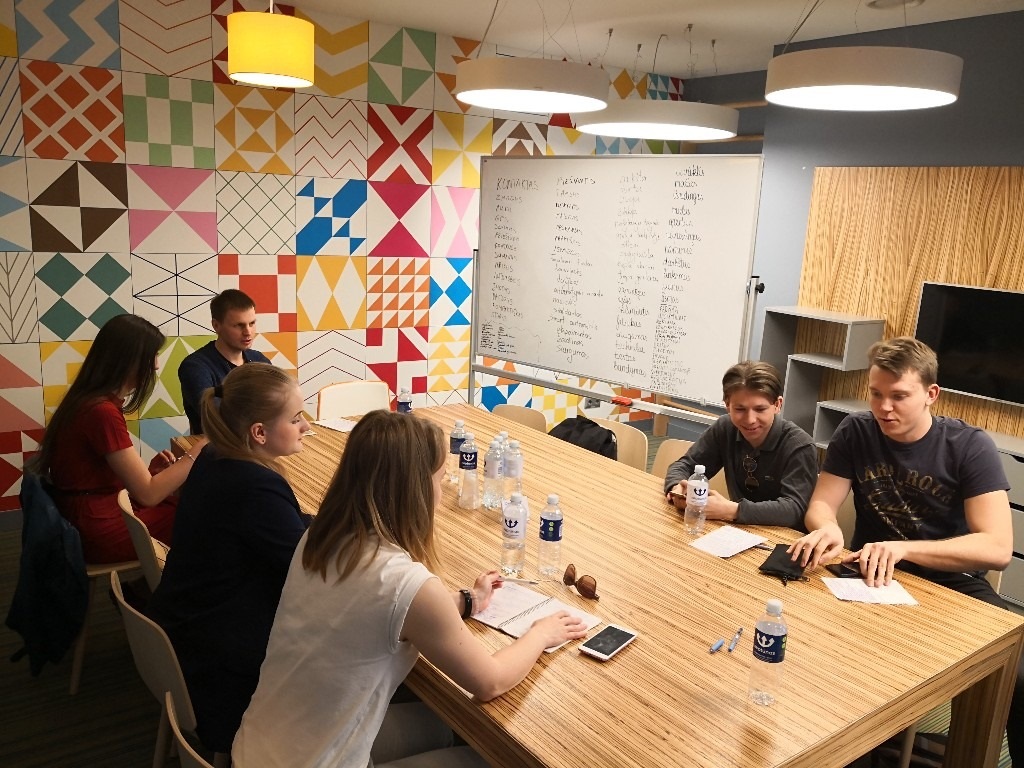For your development and career
Below you will find useful information and practical advice carefully selected by our career counsellors that will help you on your career path.
All career services are free of charge for Vilnius University students. Have any questions? You can contact us anytime via . We are located at Saulėtekio ave. 9, III bldg., room 104.
Our working hours:
I-IV 8:00–17:00
V 8:00–15:45
TAKE ADVANTAGE OF THESE FREE SERVICES
GET READY FOR YOUR CAREER
FIND A JOB
DO AN INTERNSHIP
Overcome challenges
I doubt whether to change studies / job
Decisions about career are often connected with long-term consequences, as they require a lot of time, effort and financial investment. Naturally, it is not easy to make such decisions. Decision making is often followed by doubts – whether the chosen profession, studies or job are the best possible alternative. The thing is, when we make a choice, usually (at least for a while) other alternatives close down, and we do not want to lose opportunities. Here is some advice on how to get rid of doubts and to start actively developing your career:
Collect more information
Collect more data, take a closer look at other students' occupations in your chosen profession or study program. You can find this information by analyzing graduates' career monitoring data. Contact representatives of professions or institutions that you have questions or concerns about. Mentoring might be very helpful. Learn more about job specifics. Are people satisfied with their jobs, what work aspects make them most happy and which ones do not? How do they manage to maintain work and personal life balance? Contacts of interest can be easily found on LinkedIn, https://rekvizitai.vz.lt/, and while searching for groups or associations in your field of interest – remember that the list of members is usually open. That makes it easier to find all companies in one place (e.g. Lithuanian Pharmacists' Union, Lithuanian Union of Lawyers).
Try out your choices in practice
There is probably no better way to get rid of doubts about a chosen career path, than trying it out in practice. Nowadays, the world of work is becoming more difficult, so understanding most jobs or professions just by reading about them is practically impossible. That is why direct practice will provide information about real work experience, conditions and workload – you cannot put a price on it.
You can do that by doing an internship at an organisation that you are interested in. To find an internship or work use VU database (in Lithuanian), Work In Lithuania, CV online. You can also try out volunteering, join projects in your chosen field, and challenge yourself with work during summer holidays or your spare time. If you are considering changing study program you can take a closer look at them during University initiatives like "Student for one day" and "Ask a student".
Try to get to know yourself better
Doubts about your career path may be connected with the lack of self-knowledge. Knowing your values, interests and abilities will likely help to make a better decision. More information is here.
Be open to other opportunities
Stay open to other opportunities and don’t limit yourself by your chosen profession or study program. For example, follow worldwide tendencies, not only those in the field of your interest. Choose to study extra courses that are not directly related to your study program, but are interesting to you. "Opening the door" for other options will make you more flexible if you decide to change your career path. So, do not worry if you have already made a choice, know that you can change it. When planning your career, leave space for dreams and other opportunities.
To evaluate your choice, you should honestly answer these questions:
- Is this choice really mine or imposed by someone else?
- Is what I chose – my dream? Is it a compromise?
- What other career alternatives look attractive to me?
- What strengths justify my career choice?
- What stands in my way to change the career direction, if I have doubts? How can I overcome those challenges?
If you finished the steps mentioned above and still have concerns, you can get professional help from a career counselor. Just remember to keep searching for answers – then the best one will surely come!
I cannot make a choice
This is a situation when alternative options are clear, but it is difficult to choose one. For example:
- studying in Lithuania or abroad;
- studying law, psychology or economics;
- quit unpleasant studies and choose another study program or stay and finish it;
- after finishing a bachelor’s degree continue to study master’s degree or go straight to work, etc.
These dilemmas stop students from moving forward. We offer you these steps:
Name the evaluation criteria
It is easier to make decisions when evaluation criteria are clear. It means that you should decide what is the most important before choosing a career path. For example, if your strongest criterion is to have a favorite job that corresponds to your interests, then while choosing studies you should prioritize programs that are more connected to your interests. So, first of all name the evaluation criteria using this table:
| No. | Criteria for the evaluation of an alternative |
The score for the evaluation of the criteria is given in order of importance (The sum of all points given to the criteria may not exceed 10) |
| 1. | e.g., meaningfulness | e.g., 3 |
| 2. | ||
| 3. | ||
| 4. | ||
| 5. | ||
| Total: | 10 |
Evaluate the alternatives
Based on your criteria, evaluate which alternative is the most acceptable. Use this table (listed alternatives and criteria are examples only):
| Evaluation criteria | Criterion score | Possible alternatives | ||||
| Internship X | Internship Y | Job Z | Job Q | Stay in lab | ||
| Meaningfulness | 3 | |||||
| Salary | 3 | |||||
| Flexibility of working hours | 2 | |||||
| Opportunities for development | 1 | |||||
| Distance from home | 1 | |||||
| Total | 10 | |||||
Write down your possible choices in columns. On a 10 point scale evaluate how important those choices are to you, using former criteria. Multiply each choice score by criterion score and sum total score of alternatives. The alternative that gets the highest score, rationally should be the best one for you.
If rational evaluation is not enough
It might be that a decision is connected with internal limitations or a lack of confidence. Decisions about career touch us in all aspects of life. It influences people that are important to us, that is why before you make a decision you should talk to relatives, listen to their opinion and suggestions. On the other hand, do not forget that you are the only one responsible for your career, so the final decision should be made independently. Sometimes difficulties in choosing come from deeper career or personal life problems. So if you feel stuck for a long time, we recommend getting help from a career counselor.
I want to terminate, stop, change studies
There are many reasons, why you might want to terminate studies: studies do not live up to your expectations, financial or health problems, “necessity to work”, a lack of practice and etc. However, before making this decision, we suggest not to rush and check other opportunities that could help solve the biggest causes for terminating studies. This could save time and finances. You can find more information here or contact career or academic consultant.
I do not have the necessary experience for the job
Students and graduates claim that the biggest career barrier is a lack of experience. And that is the reason why they can’t find a qualified job from the beginning of their career. To be honest, while analyzing job listings, we can often see that employer requires up to 2–3 years of experience. What should we do if we don’t have such experience? How to get it? A few tips:
Emphasize general competences
General competence – certain knowledge, abilities, skills, attitudes that are applicable in many professions and fields, can be transferred from one place to another. Vilnius University identified 5 key competences that are developed during studies and other activities at Vilnius University. These are problem solving, openness for innovation, interculturality, collaboration and consciousness. However, there are more competences that are developed during your studies or during other activities. Here are some of them:
|
Ability to analyze and summarize Ability to plan and organize General knowledge (general level of education) Oral and written state language Foreign languages General computer skills Scientific research skills Ability to learn Information management skills Ability to objectively evaluate yourself and others Ability to adapt to new circumstances Ability to generate new ideas (creativity) Problem solving Decision making |
Ability to work in team Interpersonal cooperation skills Leadership Ability to work in an interdisciplinary team Ability to maintain connections with experts from other fields Cultural and other tolerance Ability to work at international level Knowledge of culture and cultural heritage of own country and others Ability to work independently Project development and management skills Initiative and entrepreneurship Ability to follow common moral principles Priority for quality The pursuit of success |
General competences are accumulated throughout life and most of them are developed informally (not during studies), by engaging in a variety of activities, while working on temporary jobs, volunteering, during leisure activities, etc. Accomplishments in these activities could be used as real proof for employers about your general competences.
That is why while looking for a job complete these steps:
- find out what general competences could be most important for a position that is offered (it could be mentioned in the job advertisement);
- evaluate your level of general competences;
- in your CV and job interview highlight the competences you have and prove them.
You can evaluate your general competences by yourself or ask someone who knows you well to do it for you. One of the ways how you can do it yourself – do a work analysis. Write down all the important work you have done during studies, leisure time and during social activities. Choose the most important ones and describe in detail what you have done to achieve success. Think about it and name what knowledge and skills yo used to reach the goal. It will be the competences that you already have. During an interview with a potential employer, use those key experiences as examples that demonstrate your competences.
Highlight your personality traits
If you do not have work experience, your salvation could be your personality. Potential employer might be able to see talents that are not yet revealed in you. You can predict the most important personal traits for an employer, by analyzing job advertisement, characteristics of the organization. Usually employers appreciate independent, initiative, hard-working, responsible, flexible, genuine and full of enthusiasm, creative people. There is a big chance that some of the traits you already have. The only thing left to do is to name them, and prepare to prove it to an employer if asked.
Also employers usually appreciate those employees that have clear career goals and know what they want from life. That is why it is important to consider what career you are interested in, what jobs you like, what job and career goals are you trying to reach. Some advise:
Embrace your dreams. Create a wide list of your dreams and while checking it select what is the most important in your life. Rate what place career takes in your life and what areas of life are important to you.
Do not forget that life does not last forever. If you want to live life to the fullest, keep that in mind. Try to imagine what things you would like to accomplish during your life. This will help to understand better what life and career vision you have.
Explore your interests, talents and strong personality traits. Knowing what you like to do, what you are good at, what is important in life will help you to understand what activities you want to engage in. It will help to clarify your long-term goals and to form a vision of your career. On the other hand, no career vision will ever be attractive if it won’t meet your personality, interests and values.
Analyze biographies of people who are important to you. Think and choose those that you admire the most. Why are they exceptional? What do you admire the most about them? What did they achieve in life and what principals and rules of life did they use? This information will help you to understand what is important to you, what you want to accomplish in life, what kind of person you would like to be and what job and career you might want.
Seek other's help
When you have long-term work experience, your best tool is a resume (CV). Without work experience, your CV is very useful. A very important factor is recommendations, which confirm that you are a valuable candidate and it pays off for the employer to invest in you. How to expand social network and effectively use work experience read here.
Gain work experience
If you do not have work experience it is never too late to get some. Some advice on how to gain experience:
Take advantage of internship opportunities. During your studies, try to take advantage of all possible opportunities. Properly chosen internship is a great start to a future job. Sometimes after completing an internship companies offer a permanent position. So, choose your internship thoughtfully, relate it to your career goals. Take advantage of the international opportunities. This way you will gain knowledge and skills that will increase your value in the eyes of a potential employer.
Start freelancing. If getting a job is challenging because you lack experience, you can be self-employed. Get an individual activity certificate, abusiness license or a patent. It can be a great opportunity to gain legal work experience even if you will not be able to reach high financial results.
Engage in social activities. During studies you could work at student representations, clubs or other associations. There are a lot of ways to participate in public life after studies. This way you can collect work experience and network.
Volunteer. You can volunteer not only in Lithuania but also abroad. Volunteering is valuable way to gain work experience, but also to learn more about the field you are interested in, to see the world and to connect with interesting people.
Try out temporary work. Temporary or seasonal work helps you to gain and improve (so much required by employer’s) general competences.
Here you can find more information on the topic.
Lack of motivation
Probably every one of us experienced moments when motivation to study or to reach career goals decreased. For example, after a difficult exam session you might feel tired, apathetic. In this case the best thing is to take a vacation. Still sometimes that state, when you feel no interest in studies, job or career could last a while. Such a lack of motivation can cause serious health and psychological problems and prevent you from enjoying career and personal life. Learn what to do to prevent that!
What affects motivation?
Maintaining internal motivation is not that simple. It is affected by multiple internal and external factors. For example, motivation is negatively affected by inner factors like negative thoughts about the future, a fear of criticism and failure, perfectionism, unplanned activities, mechanical work. Demotivating external factors could be: strict and controlling environment, lack of challenges and knowledge. It is important to analyze the cause of changes and learn to motivate yourself.
Evaluate your motivation level
If you are wondering if you really lack motivation – check it.
First of all, read below listed statements and choose the ones that fit you best. In which list did you mark more statements? Think and evaluate what they mean to you, how they are connected to your motivation to learn and reach your goals.
| Strong motivation | Weak motivation |
|
|
Secondly, consider how you would evaluate your motivation to study or reach career goals on a scale from 0 to 10, when 0 is unmotivated at all and 10 – very motivated. We all experience motivation swings and sometimes postponing things is normal. But sometimes we feel more unmotivated then motivated. Try the following 5 ways to strengthen motivation.
Analyze the reasons for the lack of motivation
Reasons for weak motivation can be various. Understanding them better can help you choose the best ways to strengthen it.
Check out the following list of causes. Think and chose the causes that weaken your motivation to study or reach career goals. Consider if there are other causes that are not mentioned here.
- I have no set goals
- I do not have clear priorities
- I cannot plan my time properly
- I am a hedonist – I want to achieve my goals easily and I believe that studies or work should only provide pleasure
- I am a perfectionist – I want to achieve everything flawlessly; I demand only the best result from myself
- I am a fatalist – I believe that everything is destined by faith, nothing can be achieved by my own effort
- I constantly compare myself to others
- I am afraid to fail
- I do not trust myself enough
- I emphasize my mistakes and failures
- I constantly feel tired
- Studies, work do not match my interests and abilities
Further you will find methods that help to strengthen motivation.
Create a vision and set goals
Create a career vision.
A vision answers the question 'What do I want to accomplish?'. It shows the main purpose of your career path. Vision motivates, inspires, brings enthusiasm, shows direction, and helps to set goals, set priorities, give meaning to current activities (for example, studies, temporary work). Here you can find recommendations on how to create it.
Set goals.
Setting goals is the most valid source of motivation. Activities are motivated by properly formulated goals – both short-term (e. g., connected to future examination session), and long-term (e. g., connected to higher education, job, which you want to find after studies). So, take time to define goals. Define at least one goal that is connected to your studies and career. Then make a list of tasks. More information on that is here.
Reward yourself
After setting goals, think about steps and intermediate results, come up with a meaningful reward for yourself after several small steps you take towards your goal (and after you reach your goal). For example, you can cheer yourself up with a coffee break, a chocolate bar, let yourself surf the internet for 20 min, watch a movie or spend a weekend by the sea – whatever gives you more pleasure. It is a simple but effective way to motivate yourself.
Tips on how to reward yourself properly:
- come up with meaningful rewards that comply with your set goals and efforts (the more complex the goal is, the greater the reward should be);
- always follow the principle: first – the assignment, then – reward;
- if you feel tempted to do something that brings you pleasure before you start activities, promise yourself that after you finish the tasks you will do whatever you feel like;
- think about the pleasure that awaits, when you finish the task. You will gain extra strength!
Evaluate the consequences
Reflecting on your activities and their consequences from a long-term perspective will help you to understand your needs, to become more aware of what’s important and what to avoid, what you want to do and will help you focus on current actions.
Before taking on any task, answer the following questions:
- What consequences will I face if I do this?
- What happens if I back down?
- What impact will this have on my long-term goals?
- What benefits will I gain if I complete the task on time?
- How financially painful will it be if I postpone the task or will not finish it at all (e. g. how much will I have to pay for studies if I do not pass my exam)?
- Make a list of positive and negative consequences.
Manage your time. Set your priorities
Time management is like managing the sequence of your work. This skill will make you feel that you are in control of your life and it will motivate you to take action.
Tips:
- write down all tasks or work you need to do;
- prioritize your tasks or work according to your goals;
- sort tasks by their importance: 1) critical – failure to complete these tasks will have negative long-term consequences to you or other people; 2) important – failure to complete these tasks will increase the likelihood of negative consequences in the (near) future; 3) routine – what you do or must do on a regular basis;
- arrange the tasks in chronological order;
- notice whether you are occupied with insignificant tasks. If the answer is yes – stop for a second and ask yourself, what is happening, how do you feel and why it is like that. For example, are you unable to focus or do you feel tired or bored. Once you identify the problem, it becomes easier to solve it.
Just get started
The most important thing is to start. Usually everything goes easier after that. In other words, motivation appears after a real action. Take action first, then you will feel motivation. You will see – once you start, step by step you will get involved in the work and it will become more pleasant or easier than you thought.
Tips on how to start:
- devote at least 10–20 min for each task (e. g., to prepare for a seminar, to search for work). Remind yourself that after those tasks, you will be able to engage in any other activity you want;
- imagine the positive consequences of your actions;
- create an environment without any external factors which could distract your (e. g., turn off Facebook, TV, your phone during those 10–20 min);
- reward yourself for the completed actions.
Divide tasks
A simple way to motivate yourself is to divide tasks, especially the difficult ones, to smaller pieces. In this case you will avoid feeling helpless before you even start working. Think – what work (connected to your studies, job or career planning) needs to be accomplished. Divide it in to smaller pieces and complete them one by one. It will be much easier!
Tips:
- if a task seems especially difficult, break it down into the smallest possible parts;
- set a specific time when you are going to complete the task;
- specify how much time it will take to complete it. That means limit the duration of the task (for example 10 min a day);
- foresee methods and tools that could be useful to complete the task;
- find people who could provide help;
- leave the work unfinished if you failed to complete it over the scheduled timeframe. Rethink how much time you will spend on it next time;
- reward yourself for completed tasks;
- take notice on your progress when taking small steps. Pay attention to how you feel after small accomplishments and how your motivation is changing.
Admit that the task is unpleasant
When you can honestly admit that a ask is unpleasant, you will be able to consciously evaluate the situation and choose how you want to behave when faced with such a task. When you realize that – there is a bigger chance that you will finish it. Think which ones are really unpleasant for you and require the most effort. Think what you can do with a specific task: is it really important to complete it, what will happen if you do not, how do others manage to do it (e. g., breaking it in to smaller pieces).
Tips for completing unpleasant tasks:
- think and write down what is happening when you have to complete an unpleasant or difficult task: what thoughts come up, how you feel and what would you like to do labout it;
- assess whether these thoughts are holding you back. If yes, try to change them to more encouraging ones. For example, change a negative though like “I will never be able to finish this task” to a more motivating statement like “I have already done similar tasks. I can start slowly!”;
- think about why it is important to accomplish this task: what are the benefits, and what will you lose if you fail to accomplish it;
- think of ways to complete the task. What would simplify this work?
- find people who could help;
- imagine that you successfully completed the task;
- think of the relief that awaits when you finish the task.
Rethink your choices
If work or studies do not match your interests, values, priorities and abilities – you will most likely be demotivated. Continued dissatisfaction and frustration can be a sign that you need to re-evaluate your studies, job choices, and its consequences. Do your studies or job meet your personality? Do you want to change anything in your studies / work? If so, think how. Maybe you want to choose an extra course, participate in a new project at work or change studies or job entirely.
Think again about are the most important interests, values, abilities, goals and priorities for you. Evaluate how much your current studies and work fit them. Remember your career vision. If needed collect extra information about your studies, work and the perspectives they provide. Make the most appropriate choice for you and begin!
Tips for making a good decision:
- do not make sudden or unreasonable decisions. Uncertainty and lack of knowledge can cause tension and fear and that could lead you to rushed decisions or to a feeling where you do not want to change anything despite frustration;
- re-evaluate and systematize information about yourself. Use these self-assessment tools;
- collect extra information about your studies or work: what prospects do they offer? How can it change in the nearest future? How much are you allowed to participate in changing processes?
- if necessary, look for information about possible study or work alternatives;
- consider how much your studies or work fits your personality;
- consider further actions you might need to take that will help you decide.
How to balance studies and work / family
Even though at the university you will often hear recommendations to spend all your time studying and not working, we understand that it is not always possible to just study. Perhaps you have to juggle studies and work / family. We have a few solutions to make the challenge easier:
Plan. Write down all your deadlines in one calendar. Once you know all the assignment dates, estimate how much time you will need to spend on them. Add 30% of time, as you can never predict motivation crises.
Schedule time "for studies only." Despite your additional responsibilities, be it family or work, put time on the agenda for study purposes only. Create an environment that allows you to stay focused from any interference. This will allow you to do much more than if you try to do multiple jobs at once. Inform people around you to not bother you at that time.
Be realistic. When you have more responsibilities, it is not possible to maintain perfect performance in everything: to study well, to be the perfect dad / mom and to become employee of the year. Think about your priorities and accept that some of your results may be lower than expected. Also, priorities can change. For example, on Saturdays your priority could be studying, on working days – your job, at evenings – family and Saturday could be spent just for yourself.
Take care of your wellness. Balanced nutrition, daily physical activity (at least one hour-long walk), breaks and 7–8 hours of sleep will help you to maintain good immunity system, sufficient level of energy. If this is hard to imagine, try to at least sleep well and eat calmly without work or phone.
Monitor your stress level. If you notice that it interferes with concentration or sleep and you suffer from constant anxiety - reconsider your workload. Even one evening could be enough for your favourite activities and you will recover. If that is not enough, consider whether it would be beneficial to create an individual study plan and to study for three years instead of two or to reduce some amount of work.
Be brave and ask for help and consult a specialist. VU career counselors will help you to plan your time and set priorities (registration via or +37052366253). Or, if you experience a burnout, you can also contact the psychologists of VU Counseling and Training Center (for more information click here).












